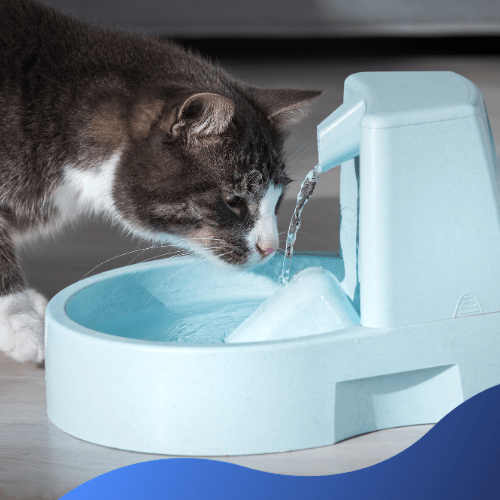Understand and manage urinary problems in your cat or dog, with our helpful information.
Urinary problems in dogs and cats are common issues that we see a lot of here at Warren House Veterinary Centre. These problems can range from mild discomfort to severe health issues, affecting the overall well-being of our beloved furry friends. In this article, we will explore urinary problems that can arise in dogs and cats, their causes, symptoms, and potential treatment options.
Common Urinary Problems:
Urinary Tract Infections (UTIs): UTIs are bacterial infections that can affect the urinary system in both dogs and cats. Symptoms may include increased urination, straining to urinate, and sometimes blood in the urine. UTIs can be caused by bacteria entering the urinary tract, often through the urethra. Any breed can get a UTI, but female dogs tend to be more susceptible.
Bladder Stones: Dogs and cats can develop mineral crystals in their urine, which can sometimes form stones in the bladder. These crystals and stones can cause irritation and inflammation, leading to pain and difficulty urinating. Certain breeds are more prone to developing bladder stones. The breeds predisposed to calcium oxalate crystals and stones are Shih-Tzu, Miniature Schnauzer, Bichon Frise, Lhasa Apso, Yorkshire Terrier, Maltese, and Poodle Crosses. Diet can also play a significant role in their formation.
Urinary Obstruction: Urinary blockage is a painful and life-threatening condition that typically affects male cats. Neutered male cats are especially prone to urinary blockage because they have many narrow urethras. A male cat’s urethra can also become blocked by small urinary stones or by urethral plugs: a mixture of cells that are used to line the bladder, mucus, and crystals formed from minerals in the urine. Unfortunately, once a male cat has a urinary blockage, there’s a higher risk of it happening again.
Incontinence: Incontinence, or the involuntary release of urine, can affect both dogs and cats. It can be caused by various factors, such as age-related changes, hormonal imbalances, or underlying medical conditions. Urinary incontinence is not normal and shouldn’t be ignored, even in an older dog. There are many different causes, ranging from congenital problems (something they are born with), to urine infections and spinal problems.
Diabetes Mellitus: Diabetes can impact both dogs and cats, leading to increased thirst and urination. The excess sugar in the urine can create a conducive environment for bacterial growth, potentially leading to urinary tract infections.
Causes Of Urinary Problems

Diet
Poor-quality diets can contribute to the formation of crystals and stones in the urinary tract. Ensuring a balanced and appropriate diet for your pet is crucial in preventing such issues. Male cats should be fed a diet that has a low level of magnesium as this contributes to the formation of stones.
Dehydration
Inadequate water intake can lead to concentrated urine, promoting the formation of crystals and stones. Ensuring that your pet has frequent access to fresh water is essential and it is recommended to refresh the water every 12-24 hours.


Infections
Bacterial infections can occur when microbes enter the urinary tract, causing inflammation and discomfort. Maintaining proper hygiene and regular veterinary check-ups can help prevent and detect infections early.
Genetics
Some breeds are predisposed to certain urinary issues. Understanding your pet’s breed-specific risks can aid in proactive preventive measures.

Treatment And Prevention
Treatment for urinary problems in dogs and cats will depend on the specific diagnosis. Veterinary intervention is crucial for an accurate diagnosis and appropriate treatment plan. The vet may recommend the following treatment:
- Medication: Antibiotics are commonly prescribed for urinary tract infections, while medications may be recommended for other issues such as incontinence.
- Dietary Changes: Prescription diets may also be recommended to manage urinary issues. Some of these diets are specialised in helping dissolve certain types of crystals and stones, to prevent their recurrence.
- Hydration: Encouraging increased water intake is essential in preventing urinary problems. Wet food, additional water bowls, or water fountains can entice your pet to drink more.
- Regular Veterinary Check-ups: Routine veterinary visits can help identify potential problems early on, allowing for prompt intervention and management.
To Conclude:
Regular veterinary care, a balanced diet, and maintaining proper hydration are key components in ensuring the urinary health of your furry companions. By staying vigilant and addressing any concerns promptly, you can contribute to the overall well-being and happiness of your beloved dogs and cats.
Thank you for reading, until next time…

